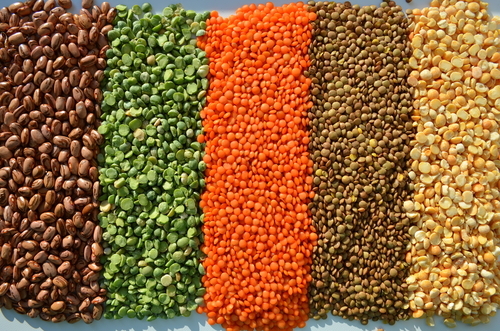Are Lentils Bad For You?
Also Known As: Lens culinaris
Short answer
Lentils are a natural, heart-healthy source of protein and fiber. Even though they may leave you a little gassy, lentils are not bad for you.
Recommended Alternative
Very healthy and numerous health benefits. A few harmful qualities may be associated, but only under certain circumstances such as an allergic reaction.
View Full Grading System
Category 'A'
Very healthy and numerous health benefits. Side effects are rare. Things rated an 'A+' are typically necessary for survival (for example, water).
Very healthy and numerous health benefits. A few harmful qualities may be associated, but only under certain circumstances such as an allergic reaction.
Very healthy and numerous health benefits. Harmful qualities may be associated, but aren't usually serious.
It is important to note that even the best things in life can become bad in immoderate amounts. So, although something may be rated an 'A+', overconsumption/overdoing can bring unwanted effects.
Category 'B'
Very beneficial to your health. Things rated a 'B+' may have a few harmful qualities to pay attention to.
Overall beneficial to your health. Things rated a 'B' may have some harmful qualities to pay attention to.
More beneficial to your health than not. However, harmful qualities are most likely associated and shouldn't be overlooked.
The main difference between category 'A' and category 'B' is the harmful qualities typically present in 'B' items. Serious side effects are usually uncommon, but are still possible and should be taken note of.
Category 'C'
Both beneficial and harmful qualities associated. Things rated a 'C+' are typically a bit more on the beneficial side. Still, moderation is important.
A fairly even ratio of beneficial and harmful qualities. Moderation is important. Very general topics that can lean towards both sides of the spectrum will be placed here as well. Rice, for example, can be good or bad depending on the type.
More harmful than beneficial. Side effects are common, especially when consumed/done excessively. Moderation is very important.
Category 'C' usually denotes to both good and bad qualities. When it comes to this category, it is important to keep this word in mind: moderation.
Category 'D'
Harmful to your health. Although benefits may be associated, the bad most likely outweighs the good. Moderation is very important.
Harmful to your health. A few benefits may be associated, but the bad outweighs the good. Moderation is extremely important.
Harmful to your health. Very few, if any, benefits are present. Things in this category should be avoided as much as possible.
Category 'D' is typically for things that are more harmful than beneficial. While consuming/doing something unhealthy once in a blue moon shouldn't hurt, we definitely recommend eliminating 'D' items as a regular part of your routine/diet.
Category 'F'
Category 'F' is for things that fail to bring anything beneficial to the table, and are very harmful to your health. We recommend completely avoiding anything in this category. Long-term side effects of 'F' items are usually very serious.
Category 'N'
'N' stands for neutral. Things placed into this category are generally (a) neither good nor bad for you, or (b) lack the necessary evidence to reach any conclusions.
Long answer
Lentils are nutritious, edible, seeds from a certain family of plants in the legume family. Lentils are an excellent source of protein and are low in both calories and fat. A single cup serving of lentils contains about 230 calories, 18 grams of protein, and 16 grams of dietary fiber. Foods high in fiber are heart-healthy, and can help reduce cholesterol. Lentils are also a natural source of folate, which helps reduce the overall risk of heart disease. Because lentils are so high in protein, they are a good source of long-lasting energy. Lentils can act as a vegetarian form of protein in many dishes, and are most common in Indian and Middle-Eastern fare.
Excessively eating lentils could have a few adverse effects, however. Fiber consumption tends to lead to flatulence, which, while not bad for you, can potentially be embarrassing. Lentils are often prepared with strong spices which can cause indigestion in some individuals. Very high levels of protein, as well as too much lysine (an amino acid found in proteins), can cause kidney damage; and too much potassium can lead to a condition known as hyperkalemia. Hyperkalemia may have no side-effects or manifest itself in the form of vomiting, fatigue, irregular heartbeat, and difficulty breathing. However, none of these are dangers of eating lentils alone, and could result from any diet with an unusually high amount of protein. Generally, individuals at risk for these types of conditions are consuming a combination of food proteins and synthetic or natural protein powders and additives.
Despite the potential of making you a little gassy, lentils are not bad for you. Any adverse effects from extremely high protein levels couldn't result from eating lentils alone, and they are a heart-healthy and natural source of nutrition.
Possible short-term side effects
Benefits
- heart-healthy
-
high in protein
-
high in fiber
-
boosts energy
-
decreased cholesterol
Our Wellness Pick
(what is this?)
TruRoots Sprouted Lentils
- USDA Organic certified
- Non-GMO verified
- Rich in nutrients
- Enhanced digestibility
- Convenient pack size
Learn More!
Please turn your Ad Blocker off to see this content. Thank you!
Thank you for your feedback!
Written by Jeff Volling
Published on: 01-22-2016
Last updated: 12-15-2023
Thank you for your feedback!
Written by Jeff Volling
Published on: 01-22-2016
Last updated: 12-15-2023

 Approved by
Approved by 















